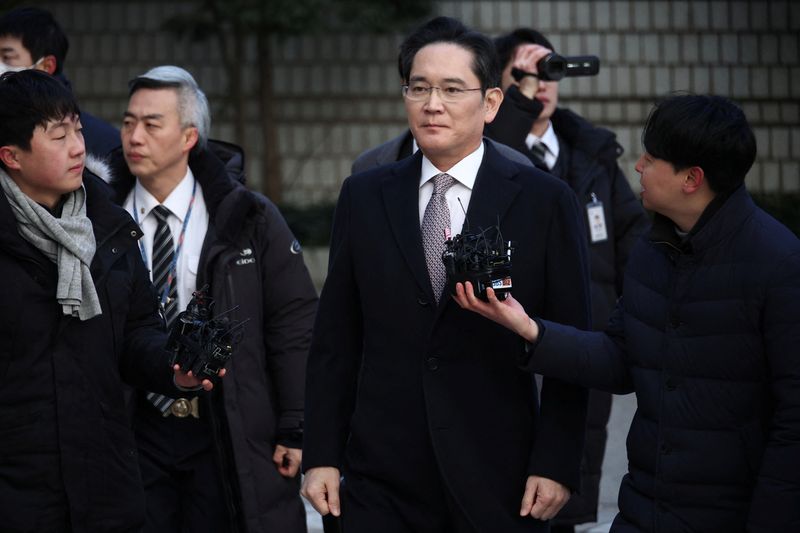(Reuters) – Samsung Electronics Chairman Jay Y. Lee was found not guilty of accounting fraud and stock manipulation by a Seoul appeals court on Monday, in a ruling that could remove long-running legal risks that Lee has faced from criminal cases.
For nearly a decade, Lee, the leader of South Korea’s biggest conglomerate, has been embroiled in a series of legal challenges including over a 2015 merger that paved the way for his succession, but raised questions over corporate governance.
The following is a timeline of events in various cases involving Lee.
2016
Nov. 13: South Korean prosecutors question Lee in a probe over a political scandal alleging wrongdoing by former President Park Geun-hye involving a personal confidant, Choi Seo-won, better known by her former name Choi Soon-sil.
Dec. 9: South Korea’s parliament votes to impeach President Park over the influence-peddling scandal.
2017
Feb. 17: Lee is arrested over his alleged role in the scandal and for paying bribes to organisations controlled by Choi to secure support for a 2015 merger of two Samsung affiliates and cement his control of the Samsung Group.
Feb. 28: Samsung Group dismantles its corporate strategy office amid accusations that Lee worked with the office to bribe former president Park and her confidante Choi.
Feb. 28: South Korean prosecutors indict 17 people including Lee over the scandal.
Aug. 25: The Seoul Central District Court sentences Lee to five years in prison for bribery, hiding assets abroad and embezzlement.
2018
Feb. 5: Lee is released from jail after an appeals court cut his sentence to two and a half years and suspended it for four years. Lee’s lawyer says he will appeal to the Supreme Court to try and overturn the conviction.
2019
Aug. 29: South Korea’s Supreme Court sends Lee’s case back to the appellate Seoul High Court for review, saying its interpretation of what constituted bribes was too narrow.
Oct. 25: The first hearing in Lee’s bribery retrial is held.
2020
Jan. 9: Samsung Group sets up an anti-corruption panel headed by a former Supreme Court judge to improve compliance and prevent violation of governance rules.
May 6: Lee makes a public apology over controversies in Samsung’s succession plans and says he will not hand over management rights to his children.
Oct. 22: Lee’s trial over suspected accounting fraud and stock price manipulation connected to the 2015 merger begins. He is accused of engineering an $8 billion merger between two Samsung affiliates – Samsung C&T and Cheil Industries – in a way that hurt the interests of minority shareholders.
Dec. 30: Prosecutors seek a nine-year jail term for Lee.
2021
Jan. 18: The Seoul High Court sentences Lee to two and a half years in prison over the bribery case.
Aug. 13: Lee is released from Seoul Detention Center on parole, amid anxiety that major strategic decisions at the world’s biggest memory chip and smartphone manufacturer are not being made. The office of South Korea’s then-President Moon Jae-in says the decision to release Lee was in the national interest.
2022
Aug. 12: South Korea’s President Yoon Suk Yeol pardons Lee over the bribery case, with the justice ministry saying the business leader was needed to help overcome a “national economic crisis”.
2023
Nov. 17: Lee denies wrongdoing after South Korean prosecutors called for him to be jailed for five years on the charges of accounting fraud and stock price manipulation.
2024Feb. 5: The Seoul Central District Court clears Lee over the accounting fraud and stock manipulation charges.
Feb. 9: South Korean prosecutors say they will appeal.
May 27: A South Korean high court begins hearing a prosecution appeal over the case.
Sept. 24: South Korea’s National Pension Service files a lawsuit against Lee with a Seoul court seeking damages over losses incurred from the merger of the Samsung affiliates.
2025
Feb. 3: Seoul appeals court finds Lee not guilty on all charges related to the 2015 merger.
(Reporting by Seoul bureau; Compiled by Ed Davies; Editing by Kate Mayberry)
Source link
